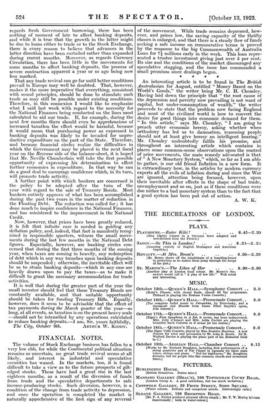FINANCIAL NOTES.
The volume of Stock Exchange business has fallen to a very low ebb, for while the Continental political situation remains so uncertain, no great trade revival seems at all likely, and interest in industrial and speculative securities has waned. In the markets, too, it is found difficult to take a view as to the future prospects of gilt- edged stocks. These have had a great rise in the last eighteen months, as a result of the diversion of funds from trade and the speculative departments to safe income-producing stocks. Such diversion, however, is a condition of the change from trade activity to depression, and once the operation is completed the market is naturally apprehensive of the first sign of any reversal of the movement. While trade remains depressed, how- ever, and prices low, the saving capacity of the thrifty classes is enlarged, and that there is a steady flow of funds seeking a safe income on remunerative terms is proved by the response to the big Commonwealth of Australia Loan for 7i millions early in the week. This loan repre- sented a trustee investment giving just over 5 per cent. Its size and the conditions of the market discouraged any speculative stagging, and the issue has commanded a small premium since dealings began..
An interesting article is to be found in The British Australasian for August, entitled "Money Based on the World's Goods," the writer being Mr. C. H. Chomley. Having laid down the principle that "the root cause of the depression and poverty now prevailing is not want of capital, but under-consumption of wealth," the writer proceeds to state that the problem now facing England and most of the civilized world is how to convert the desire for good things into economic demand for them. "In this article," says Mr. Chomley, "I am going to preach utter economic heresy, asking whether when orthodoxy has led us to damnation, reasoning people should not at least give heresy an intelligent hearmg." Mr. Chomley undoubtedly fulfils his promise, and throughout an interesting article which contains in places some common-sense observations upon the control of price movements, the main remedy advocated is that of A New Monetary System," which, so far as I am able to gather, is our old friend Inflation in a new form. It is extraordinary how, in the articles by modern currency experts all the evils of inflation during and since the War are ignored, attention being focused, however, upon their inevitable after effects in the shape of bad trade, unemployment and so on, just as if these conditions were due rather to a bad monetary system than to the fact that a good system has been put out of action. A. W. K.


























































 Previous page
Previous page